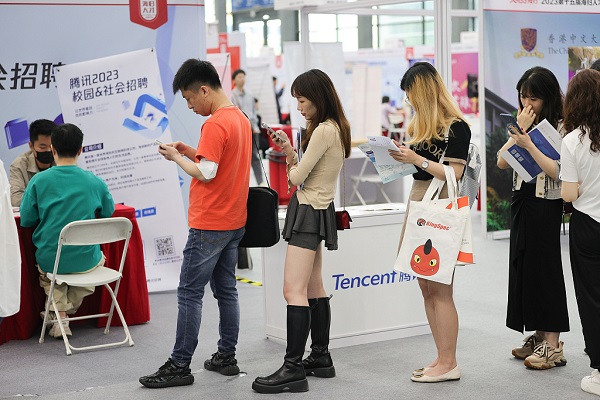Jobs, regional integration get major lift

Job seekers check out a booth at a job fair held in Shenzhen, on April 15, 2023. [Photo/VCG]
A total of 12.44 million new jobs were created in China's urban areas last year thanks in part to the efforts of governments at all levels and various funding, Liu Jieyi said at a news conference on Sunday.
Liu, spokesman for the second session of the 14th National Committee of the Chinese People's Political Consultative Conference, the nation's top political advisory body, said funds exceeding 300 billion yuan ($41.7 billion) were provided to directly support employment and entrepreneurship.
Targeted measures were also adopted to support the employment of young people including college graduates and help people facing difficulties in urban and rural areas to land jobs, he added.
This year, the CPPCC will continue work focusing on stabilizing and expanding employment, such as organizing research to promote employment of college graduates, Liu said.
On the development of China's private sector, Liu said the nation will take further steps to optimize the business environment for the sector's growth, with a key focus on the clearing of arrears owed to enterprises.
The private sector is a vital force in advancing Chinese modernization and plays a significant role in promoting technological innovation, expanding employment and improving people's livelihoods, he said.
A series of policy measures aimed at bolstering the high-quality development of the private sector has focused on solving private enterprises' practical problems and greatly boosted their confidence.
He said the prospects for the private sector are promising due to the sustained growth of the country's economy.
The CPPCC National Committee has made great efforts to address the pressing concerns of private enterprises, such as financing difficulties and protection of their legitimate rights and interests. It has also helped them enhance their competitiveness, he added.
Liu told the packed news conference that the CPPCC has always been concerned about the economic and social development of the Guangdong-Hong Kong-Macao Greater Bay Area.
Alongside various policies promoting cross-boundary connections and the one-hour life circle — the ability to travel between major cities in just 60 minutes — that are taking shape, integration of the GBA has grown in leaps and bounds.
National political advisers have provided suggestions and proposals on various aspects to accelerate the integration of the GBA market in the past year, he said. These include optimizing cross-boundary compliance systems for financial data, promoting the digitalization of industries and establishing mechanisms for sharing talent.
CPPCC National Committee members from the Hong Kong and Macao special administrative regions also conducted research trips to multiple locations in Guangdong province, with a focus on exploring cooperation and development with Hengqin, Qianhai and Nansha.
With a population of 87 million, the GBA's economic output is estimated to top 13.6 trillion yuan in 2023 — 1 trillion yuan more than that in 2021 — data from Guangdong's Development and Reform Commission showed.
During this year's Spring Festival, 2.52 million mainland residents traveled to Hong Kong and Macao, while 2.49 million trips were made the other way, Liu said.
All rights reserved. Presented by China Daily









